CHANGING GEAR SAACI inspires positive change


INDUSTRY INCLUSIVITY
Why diversity, equality and inclusion matter more than ever

INTIMATE MEETING PLACES
Meet small, or not at all
HOLE-IN-ONE OPPORTUNITY
Seal the deal on the green
MAY/JUNE 2021 • Issue 96
R55.00 (incl. VAT) ISSN 1684-9264
SANDTON, GAUTENG
FOR THE ULTIMATE accommodation experience, Hilton Sandton features amenities for both business and leisure travellers alike. On-site features include an all-day restaurant, a state-of-the-art business centre, meeting facilities, fitness centre, outdoor pool and tennis court; and if you still can’t find what you’re looking for, the hotel provides complimentary shuttles to both Sandton City and the Gautrain station.
LOCATION
Situated in the Sandton business district in the heart of Johannesburg, Hilton Sandton’s convenient location offers guests easy access to large shopping centres, main banking institutions and the Johannesburg Stock Exchange.
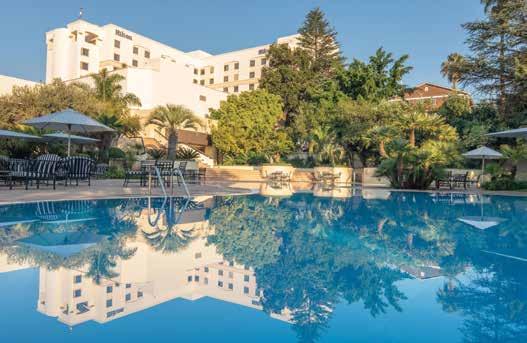

MEETINGS AND EVENTS
Hilton Sandton offers distinctive spaces in a prime location for conferences and events. Each of its nine meeting rooms is completely customisable and features state-of-the-art technology. For added convenience, meeting facilities are located on the same floor as the full-service business centre, restaurants and bar.
ACCOMMODATION
All Hilton Sandton’s guestrooms feature stylish furnishings and generous amenities. Guests who stay in the Royal Suite or one of the six Terrace Suites on the Executive Floor can enjoy exclusive access to the Executive Lounge. Hilton also offers non-smoking and four accessible guestrooms. Guestroom facilities include LCD televisions and satellite channels with radio, video-on-demand and Wi-Fi.
CATERING


Sample a multicultural all-day dining experience at Tradewinds Restaurant & Bar. For the best of fusion flavour, the Lotus Teppanyaki & Sushi Bar offers a variety of popular sushi dishes, all carefully created by Hilton Sandton’s sushi master.



For an intimate get-together with friends or a quality corporate team-building experience, join the hotel’s Sushi School on Friday nights.
VENUES
MEETING SPACES 12
MAX PAX 900
ACCOMMODATION 329 ROOMS
Rivonia Road,
hilton sandton HiltonSandton
138
Sandton, Gauteng 2196
AND CAPACITIES
sandton.hilton.com Room Name Boardroom U-shape Theatre Classroom Cabaret Banquet Dinner Dance Cocktail Hilton Ballroom - - 900 450 270 450 380 1 000 Ballroom 1 40 50 200 90 50 100 80 180 Ballroom 2 70 70 300 150 96 160 120 300 Ballroom 3 50 50 200 100 72 120 70 240 Kwena Suite 40 35 100 60 42 60 40 100 Kwena 1 20 15 30 20 12 20 - 30 Kwena 2 20 15 30 20 12 20 - 35 Li-duba 30 30 80 40 30 50 30 75 Tau 30 30 80 50 35 60 40 80 Umkombe 30 28 80 40 30 50 30 80 Thema 16 12 20 15 - 20 - 25 Boardroom 14 - - - - - -Impala 10 10 15 10 - 15 - 20 Dzimba 10 10 15 10 - 15 - 20
+27 (0)11 322 1888 jnbsa_bqsales@hilton.com
04 COVER STORY: SAACI
Changing gear As a full hybrid event, SAACI’s 2021 Annual National Congress was like no other. Meetings provides some insights from the action-packed, twoday experience.

06 FOCUS: INDUSTRY INCLUSIVITY



Meetings understands why establishing an inclusive sector should be at the forefront of the MICE industry’s efforts.


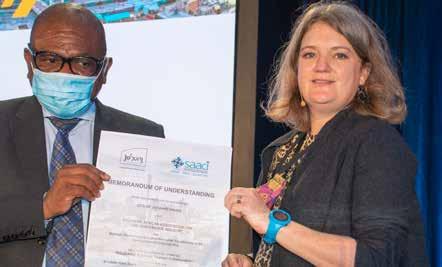

09 MICE EXPERIENCES: GOLFING
South Africa is home to some of the world’s most beautiful golf courses. Meetings explores what makes these offerings so unique and how the popular outdoor pastime can be used as an effective business tool.


10 06 CONTENTS 24 MAY/JUNE 2021 04 The Planner is
its footprint –
with us today! @theplannerguru The Planner @theplannerguru the-planner-guru
growing
connect
RESEARCH African Perspectives on the MICE
SKILLS New talent 22 MEETING PLACES Meet small 24 INNOVATION Destination management companies REGULARS 02 Ed’s Comment 03 Tidbits 15 5 mins with… 32 Miss Meet TALKING POINTS 28 SAEC 29 AIPC 30 EGF + AAXO 31 SAACI + PCO Alliance Network 22 12
16 UIF TERS update 18
Industry Report 20
EXPECT THE UNEXPECTED
Our resilience was tested once again with President Ramaphosa announcing on 30 May 2021 that the rising number of daily Covid-19 cases meant that South Africa would be moving to Alert Level 2 lockdown with immediate effect. This saw both indoor and outdoor capacities curtailed from 500 people outdoors to 250, and 250 indoors to just 100. In addition, bars and restaurants need to close at 22:00 to allow staff to make it home in time for the curfew, which now falls between 23:00 and 04:00. All social distancing and hygiene protocols, such as the mandatory wearing of masks, remain.
A year ago, when we were still finding our feet in managing the impact of the pandemic, this news may have come as absolutely devastating to us. Now, we manage it by reducing numbers and adjusting plans accordingly. While I believe that many of us have accepted that the pandemic might be a theme throughout our planning and in each of our engagements for quite some time, the events industry is one that is demonstrating its strength and ability to operate by the book. Nowhere do we see this more than in the live, in-person events that are taking place at the moment, such as the SAACI National Annual Congress (page 4)
– a remarkable showcase of what the industry is capable of.
During this time, we
have also seen a lot of dialogue around diversity and inclusion. With the Covid-19 pandemic further spotlighting the plight of those who are currently marginalised and, therefore, do not have access to the same opportunities, I feel it is more important than ever that we have these key conversations. For this reason, we have chosen this as our focus issue for this edition of Meetings (read more on page 6).
Another key discussion coming out of the pandemic is the value of our data and protecting it. To answer the call for more Africa-related data, especially within the MICE industry, Niche Partners has officially launched its 2021 African Perspectives on the MICE Industry Report. Meetings has been privileged to be part of this journey, and the report is now delivering insights and research that provide a more informed voice for our industry. This is, in my opinion, at the heart of why the African Perspectives Report is so key for our industry – more in-depth information leads to better and more empowered decision-making! Turn to page 18 for a taste of what you can expect from the report.
Through many ups and downs, we have made it this far. And with vaccines on the horizon as well as a proven track record of successfully hosting in-person events, I feel there is a definite light at the end of the tunnel. Let’s keep pushing and, of course, collaborating – because none of us got this far on our own.

Managing Editor Shanna Jacobsen (shanna@3smedia.co.za)

Chief Sub-Editor Tristan Snijders
Head of Design Beren Bauermeister
Contributors Sven Bossu, Glenton de Kock, Mike Lord, Lynn McLeod, Heidi Newton-King, Cheryl Norwood-Young, Tes Proos, Carol Weaving
Production & Client Liaison Manager





Antois-Leigh Nepgen
Group Sales Manager Chilomia Van Wijk
Bookkeeper Tonya Hebenton
Distribution Manager Nomsa Masina
Distribution Coordinator Asha Pursotham
Advertising Vanessa De Waal +27 (0)84 805 6752 | Vanessa.DeWaal@3smedia.co.za
PUBLISHED BY
Publisher Jacques Breytenbach
3S Media
46 Milkyway Avenue, Frankenwald, 2090 PO Box 92026, Norwood 2117

Tel: +27 (0)11 233 2600 Fax: +27 (0)11 234 7274/5 www.3smedia.co.za
Meetings MAY/JUNE 2021 © Copyright

All rights reserved 2021 www.theplanner.guru
SUBSCRIPTION
R330.00 per annum (incl. VAT) | subs@3smedia.co.za


ISSN 1684-9264
NOTICE OF RIGHTS Meetings is published bi-monthly by 3S Media. This publication, its form and contents vest in 3S Media. All rights reserved. No part of this book, including cover and interior designs, may be reproduced or transmitted in any form or by any means, electronic or mechanical, including photocopying, recording or by any information storage and retrieval system, without permission in writing from the publisher, nor be otherwise circulated in any form of binding or cover other than that in which it is published and without a similar condition being imposed on the subsequent purchaser. The authors' views may not necessarily reflect those of the publisher or associated professional bodies. While every precaution has been taken in the preparation and compilation of this publication, the publisher assumes no responsibility for errors, omissions, completeness or accuracy of its contents, or for damages resulting from the use of the information contained herein. While every effort has been taken to ensure that no copyright or copyright issues is/are infringed, 3S Media, its directors, publisher, officers and employees cannot be held responsible and consequently disclaim any liability for any loss, liability damage, direct or consequential of whatsoever nature and howsoever arising.
MEMBER OF IN COLLABORATION WITH
Shanna
The ABC logo is a valued stamp of measurement and trust, providing accurate and comparable circulation figures that protect the way advertising is traded. Meetings is ABC audited and certified.
ED’S COMMENT
During times of uncertainty, nothing is cast in stone, so don’t expect otherwise.
Four Points by Sheraton debuts in Uganda
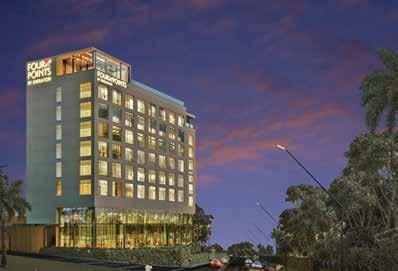

Portman Square Limited has inked a deal with Marriott International to debut its Four Points by Sheraton in Kampala, Uganda. Due to open in 2022, the Four Points by Sheraton Kampala will be operated under a franchise agreement and managed by the owners and developers of the property, Portman Square Limited. Speaking on the deal was Yasin Munshi, director: Development, East Africa, for Marriott International, who commented: “We are excited to debut the Four Points by Sheraton brand in Uganda and further strengthen our relationship with Portman Square. Four Points is one of the fastest-growing hospitality brands in the world and we are continuing to see great opportunities to expand the brand’s portfolio across Africa.”
Meetings’ must-know minutia

Kenya Airways, Airlink sign network deal

Kenya Airways and South Africa-based private sector airline Airlink have signed an interline agreement that will boost their respective networks. The deal will allow Airlink passengers access to Kenya Airways’ network of African destinations, which include Bujumbura in Burundi, Tanzanian capital Dar es Salaam, Entebbe in Uganda, Kigali in Rwanda, and Kinshasa in the Democratic Republic of the Congo.
Meanwhile, through Airlink’s Johannesburg and Cape Town centres, Kenya Airways can now provide flights to Windhoek in Namibia, Durban and Port Elizabeth in South Africa, Botswanan capital Gaborone, Maputo and Pemba in Mozambique, and Maseru in Lesotho.
“The agreement presents new growth opportunities for both airlines and will strengthen aviation ties between Kenya and Southern Africa. This partnership also plays a significant role economically, improving trade exchange and spurring tourism across the continent,” said Kenyan Airways in a statement.
Sun City gets ISO certification
Sun City Resort has been awarded an ISO 14001 certification for the responsible manner in which it interacts with its environment and uses scarce resources. These efforts include the installation of a wastewater treatment plant that recycles Sun City’s wastewater to irrigates the golf course, as well as 216 solar units at Sun City’s staff village where the resort’s employees reside. This saves at least 90 000 kWh per month, or more than 1 MWh each year. “Changing public perception is at the core of our operations as we aim to have a positive reputation with surrounding communities,” says Lwazi Mswelanto, manager: SHE at Sun International.
Cisco to acquire Socio
In mid-May, Cisco announced that it intends to acquire Socio Labs Inc – a four-year-old event management solutions company that has now become a highly sought-after asset. With the addition of Socio to its portfolio, Cisco is looking forward to empowering event organisers to provide more inclusive and engaging experiences for both in-person as well as virtual attendees across each event, regardless of size and format.
Socio has been ahead of the curve on engagement trends and at the beginning of the pandemic, it built a virtual eventing suite to provide a solution for seamless hybrid events.
UFI recognises economic impact of exhibitions
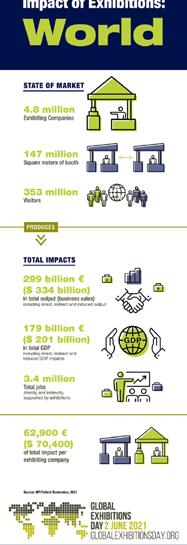

The Global Association of the Exhibition Industry (UFI) recently released figures revealing the impact of exhibitions on the global economy. These indicate that US$334 billion (R4.6 trillion) in sales are made across 4.8 million exhibitors annually, generating $201 billion (R2.77 trillion) in GDP.

A key aspect of ensuring exhibitions can safely host visitors at previous levels in markets such as Europe has been the implementation of the All Secure Standard – a medically vetted best practice guide that has been brought together by a number of organised events companies. It looks at four cornerstones: protect and detect, cleaning and hygiene countermeasures, physical distancing, and communication.

www.theplanner.guru MEETINGS l MAY/JUNE 2021 • 3
CHANGING GEAR

THE LOGISTICS
The 2021 Southern African Association for the Conference Industry (SAACI) Congress was a remarkable showcase of what the business events industry can achieve. While many still have reservations around meeting safely in-person, the two-day event adhered to all health and safety regulations, reassuring delegates that their well-being was a top priority during their attendance.
Held over two days between 19 and 20 May 2021, SAACI’s Annual National Congress welcomed strong participation from a number of industry bodies, including the South Africa National Convention Bureau (SANCB).
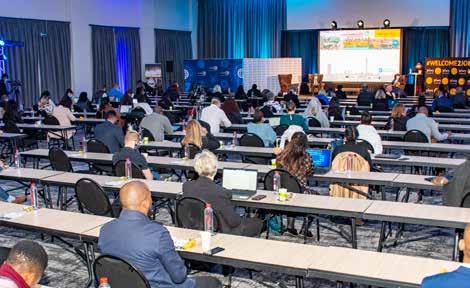
Speaking on the first day, during the SANCB’s capacity building session, a point raised by Amanda Kotze-Nhlapo, chief convention bureau officer at the SANCB, is that if we are encouraging people to meet in-person, we also need to demonstrate that we are prepared to do the same.
“We talk about recovery, but we can only recover if we go out there again,” she noted.
Since its establishment in 2012, the SANCB has been key in the development of meetings, incentives, conferences and exhibitions (MICE), not just in South Africa, but also Africa. Through its bidding support programme, the SANCB has been able to provide R137 million in assistance. This has ensured that large, international conferences can take place on South African soil, which has contributed R37 billion to the economy.
Through its revised bidding support programme, the SANCB is encouraging greater inclusivity, which you can read more about on page 8 in our industry inclusivity showcases.
ARRIVED INTRIGUED, LEFT INSPIRED
Any reservations we had around meeting in-person were quickly dispelled as the social distancing and hygiene protocols in place ensured we could all have peace of mind and enjoy the inspiring sessions.
“As we arrived for the SAACI Annual National Congress this week, many of us were not sure what the experience would be like, as it was the first time in 15 months that the business events industry met as a collective since Meetings Africa 2020. Well, the experience was refreshing. It was an experience of human interaction away from a screen, away from isolation, and one that was filled with knowledge and conversations that will indeed shape how we move ahead during the course of the next few months. It was clear that industry stakeholders needed to reconnect, and to check in with each person,” said SAACI in post-event communication.
After being postponed last year, during what would have been the height of the first wave of the Covid-19 pandemic in South Africa, the in-person component of the SAACI Congress took place at the newly refurbished Kgotla meeting rooms at the Indaba Hotel in Fourways, Gauteng. The event observed all protocols, including social distancing, sanitisation and hygiene, and screening.
The virtual component of the event was supported by EventsAir, which caters for impressive interactivity and gamification, with delegates earning points for their engagement.
Between its in-person and online attendance, SAACI saw 362 delegates tuning in for the event – its largest turnout yet.
4 • MEETINGS l MAY/JUNE 2021 www.theplanner.guru COVER STORY
As a full hybrid event, SAACI’s 2021 Annual National Congress was like no other. Shanna Jacobsen provides some insights from the action-packed, two-day experience.
SAACI has played a pivotal role in highlighting the plight of the ailing business events industry to national government and is working closely with local bodies to support the recovery of the MICE sector. The Congress kicked off a day after the Minister of Tourism, Mmamoloko Kubayi-Ngubane, delivered her department’s 2021/22 budget vote, where she noted that:
• 55 bids for international meetings, incentives, conventions and exhibitions were submitted for the period 2022-25
• the 55 bid submissions have a combined estimated economic impact of R899 million and may potentially attract 30 521 international and regional delegates to South Africa during 2022-25
• thus far, South Africa has won 16 of the bids submitted for the 2020/21 financial year, with a 29% conversion rate
• these secured business events will contribute
R296 million to South Africa’s economy between 2022-25 and attract 9 825 international and regional delegates.
BIG ANNOUNCEMENT
Delegates were abuzz upon arrival on the morning of the second day, as a big announcement was due to take place. Attendees were not disappointed when Executive Mayor Cllr Geoffrey Makhubo of City of Johannesburg (CoJ) arrived to sign a three-year memorandum of understanding (MoU) with SAACI on various areas of cooperation under what will be known as CoJ | SAACI Business Tourism Collaboration. This will explore the following areas of opportunity:
i. Co-bidding and mutual coordination – the creation of joint bidding activities for key identified conference/conventions for CoJ. A joint approach with SAACI members will be developed to ensure that ‘Destination Johannesburg’ increases its number of hosted business events. Identification of clients where the city would be of interest followed by the creation of joint proposals/bids highlighting or based on synergies between SAACI members
FURTHER READING
• SANCB Bidding Support Programme Review
• SANCB National Association Project
• Minister Mmamoloko KubayiNgubane – Tourism Department Budget Vote 2021/22
and the CoJ with legacy benefits through working together.
ii. Enterprise development – the creation of a full business events value chain, which will form the framework of a dedicated business events incubation system or programme [CoJ | SAACI Business Tourism Collaboration], which will develop capacitates of entrepreneurs and also grow innovation organically in line with the future needs of the industry.
iii. Research, statistics analysis and intelligence – analysis of studies focused on industry trends, security (risk analysis), governance (impact of policy that may influence how business events are managed in the future), and defence (terrorism). This will include identifying opportunities for CoJ based on current leads and existing partnerships with SAACI.
iv. Business events promotion and sales activity – the collaboration will identify how association buyers and industry decisionmakers are educated on ‘Destination Johannesburg’, with the aim of forging longterm relationship development.

v. Work opportunities – establish job creation programmes in business events industry that are a specific key part of the collaboration.
vi. Youth learning – access and utilisation of the SAACI Online Academy matched through masterclasses, which will be developed within the parameters of the MoU. The unemployed graduates and youth active in the business events industry will be considered in the development of this programme.
vii. Joint collaboration for MICE strategic initiatives – through agreements/MoUs with partner associations, a joint implementation of high-impact initiatives will be embarked on.
“SAACI views strategic partnerships like these as a way in which public and private sector can work towards the recovery of the industry,” enthused Kim Roberts, national chairperson of SAACI, on the signing of the MoU.
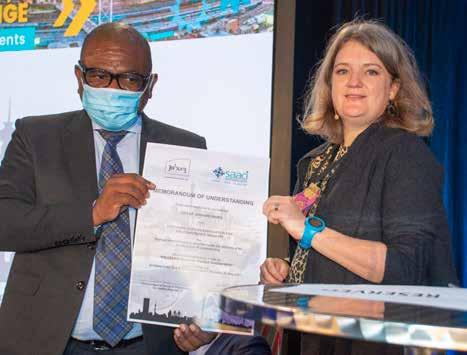

#SAACICONGRESS2021
SAACI Official @SAACIOffical #saaci SAACI Official saaci.co.za +27 (0)11 880 5811
Geoffrey Makhubo, CoJ Executive Mayor, with Kim Roberts, SAACI National chairperson, during the signing of the CoJ | SAACI Business Tourism Collaboration that took place at the Indaba Hotel on 20 May 2021
Attendees have a look at the sustainability market. Each attendee was given 150 ‘SAACI Bucks’ to spend at the market to support the small businessowners in their endeavours
ALL FOR ONE, AND ONE FOR ALL
Sticks in a bundle are unbreakable. Unity in diversity. The more, the merrier. All of these idiomatic references are commonly used but should also extend to our business objectives and be at the very heart of what we do.


EMPHASIS ON INCLUSIVITY
Although there was already a global movement towards ‘inclusivity’, it is a word we have heard more over the past year than in previous times. The Covid-19 pandemic is one of the most
impactful disasters we have ever faced as a human race. Typically, disasters are defined by the number of people they have affected, and the Covid-19 crisis has had a devastating effect. For those who are considered as being marginalised, their suffering has only been further exacerbated because already-stifled opportunities have now been completely depleted in the wake of the economic fallout caused by the pandemic.
To put this in perspective, according to a UN report on the impact of Covid-19 on women, million women and girls have been pushed into extreme poverty.
Inclusivity is a broad term – as it should be, because that is the thrust of what it means to have inclusive environments. It levels the playing field to ensure that those who are marginalised can access the same opportunities, and that each person and their contribution is based on what

value they bring, and not superficial traits such as physical appearance. In its truest sense, inclusivity knows no colour, creed, social standing or sexual preference.
In a business context, inclusivity means that we can ensure everyone is accounted for across all facets of the operation – from encompassing target audience strategies, to successfully establishing a flourishing work environment that fosters a sense of belonging and purpose.
In South Africa, we have come a long way from the very dark days of apartheid but we still have a distance to go before we are truly inclusive –both in the workplace and in our homes.
“For inclusivity to play a role in the South African context, it is vitally important that we first redress the wrongs of the past, and ensure that transformation leads the drive towards inclusivity, so that the playing fields are first equalised before we can talk about inclusivity,” says John Arvanitakis, CEO and founder of Chat’r and a director at SAACI’s Johannesburg branch.
If history has taught us anything, it is that the destructive nature of divisiveness leads to chaos, conflict and corruption. If left unchecked, it can give rise to human rights abuses that might take many generations to correct. In business terms,
FOCUS
Meetings understands why establishing an inclusive sector should be at the forefront of the MICE industry’s efforts.
6 • MEETINGS l MAY/JUNE 2021 www.theplanner.guru
FURTHER READING
exclusive preference towards only a select few individuals has resulted in glaring imbalances. These have meant we are now left tackling issues such as the gender pay gap, and leadership that isn’t representative.
FORMING A GREATER NARRATIVE
Differently abled people, people of colour, those who have certain belief systems or cultures, along with the youth, elderly, women and people who are part of the LGBTQ+ community are among the individuals who are currently most excluded.
In a McKinsey & Co. article from February this year, the importance of inclusivity is discussed as being central to both organisational leadership and well-being.
“Our research finds that a positive team climate – in which team members value one another’s contributions, care about one another’s well-being, and have input into how the team carries out its work – is the most important
driver of a team’s psychological safety,” says the consultancy, adding that team leaders are more likely to demonstrate supportive and consultative leadership if senior leaders demonstrate inclusiveness (see graph for more).
As an approach, diversity and inclusion (D&I) is also becoming an important part of environmental, social and governance (ESG) reporting and principles.
“To overcome some common barriers to ESG and specifically D&I reporting, executives should embrace three leading practices: construct an inspiring story, engage the right leaders, and take a data-driven approach. Organisations that are successful in this initiative will be better able to communicate their commitment and progress, increase employee engagement, manage associated risk, and ensure their efforts are achieving their goals – while also improving their reputation and performance, as well as gaining greater interest from investors,” says PwC on the topic of inclusivity.
WHY D&I MATTERS IN MICE – A FLOCK 101
• Brings different and innovative perspectives to the table
• Provides access to a bigger pool of talented speakers
• Grabs the attention and interest of a larger audience
• Fosters an environment that challenges people to think differently about one another, which creates unique learning experiences everyone benefits from
• McKinsey & Co. featured insights on diversity and inclusion
• The Realized Value of Equality, Diversity and Inclusion – EDI interventions
• Getting serious about diversity and inclusion as part of your ESG reporting
BUILDING TOWARDS INCLUSIVITY IN MICE

In its ‘12 Event Trends for 2021’ guide, Flock Eventing Platform identifies D&I as an important trend for the events industry.
“Racial inclusivity and gender equality are at the forefront globally in 2021 and the events industry needs to do its part in correcting imbalances in the world.

“Panel speakers are the easiest way to include minorities and marginalised communities. Representation is important for anyone to feel they can participate and belong in a given space.
“Additionally, inviting and sponsoring attendees who would not otherwise have access to the wealth of knowledge shared at a particular event is a simple way for events to make a difference,” says Flock in its trends guide.
For the MICE industry to truly grow in South Africa, we need to encourage more members that will represent the actual demographics of our country to join and actively participate in the industry associations and regulatory bodies, says John.
“The post-Covid-19 recovery of our industry is an ideal opportunity to drive transformation in our sector and ensure its inclusivity within the South African context. The global business events industry will be recovering, and the opportunity should be to promote a more inclusive and broader network of venues, organisers and suppliers to the bidding process for organising and hosting these events in South Africa by a transformed sector. It is vitally important to ensure the relevance and economic recovery of this sector; transformation should be driving our recovery,” he concludes.
www.theplanner.guru MEETINGS l MAY/JUNE 2021 • 7 #INDUSTRYINCLUSIVITY
Continuously championing diversity and cultivating true inclusion requires thought and care. This is a singular moment to be a leader in business. The pandemic has made clear the weaknesses in our systems and institutions, but it also offers a chance for us to step up and shape a more equal future.”
Rusty Wiley, CEO of Datasite, in an excerpt from Forbes.com
INCLUSIVITY IN ACTION
Rather than merely talking about how to incorporate elements of diversity, equality and inclusion into their business processes and strategies, these Meetings showcases present inclusivity in action within the MICE industry.
READ MORE:
SPIER HOTEL & WINE FARM
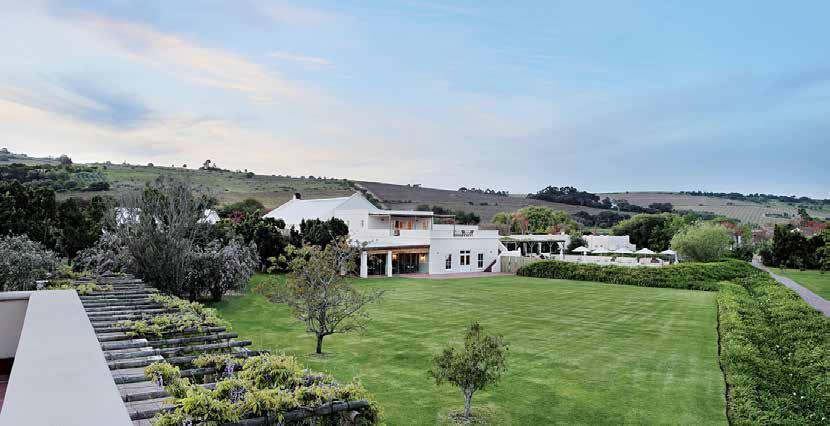
About Spier and its community ethos.
By Heidi Newton-King, director: Sustainability and Human Resources at Spier
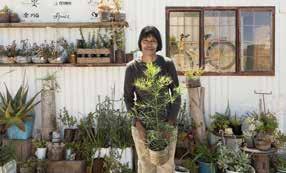
Situated on a 600 hectare property, Spier plays an important role in growing and developing its surrounding community, and focuses on two areas within poverty reduction, specifically:
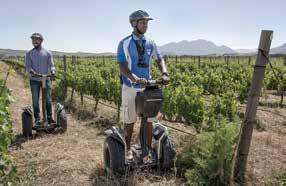
1TACKLING YOUTH UNEMPLOYMENT
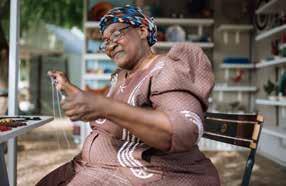
We have an essential role to play in tackling this through our business directly and supporting local initiatives. We have partnered with Harambee Youth Accelerator and the Yes4Youth initiative to ensure young people can access opportunities. Before the lockdown last year, we actively resourced up with 11 young people from our local community to support food garden development, contributing to our food support in the community. Operationalising a focus like this requires broad buy-in and support to, in turn, inspire the success of the cohorts who join the business.
2
FOOD SECURITY
Our recent collective Covid-19 experience exposed fault lines and jolted many, including ourselves, to face the very real food security
issues we face in our local communities. Exacerbated by the pandemic, the bringing together of like-minded partners ensured we could respond quickly and collectively. We pooled resources to provide food parcels from the beginning of lockdown through a partnership with the Sustainability Institute. We have assisted our local families with resources to transition once the formal food support ended in February 2021.
These are the most recent and relevant examples in the times we find ourselves. More broadly, being an inclusive business sees our team being inspired and motivated to work for a company whose clarion call is as a ‘force for good’.
Moving away from traditional CSR and towards full integration into the way we do business, how can the way we do things make a difference every day?
We recognise that our response to the climate and biodiversity crisis, our holistic approach to the people who work for us, and our business and partnering procurement approach can positively impact key drivers like poverty, decent work, and responsible business practices.
8 • MEETINGS l MAY/JUNE 2021
FOCUS: INDUSTRY INCLUSIVITY
AFRICA TRAVEL WEEK
Africa Travel Week (ATW) focuses on inbound and outbound markets for general leisure tourism, luxury travel, LGBTQ+ travel and the MICE/business travel sector, as well as travel technology. Its shows include ILTM Africa, WTM Africa, EQUAL Africa, IBTM Africa, Travel Forward, the Sports & Events Tourism Exchange, and the African Tourism Investment Summit. During the 2021 ATW event that took place in April, there was a strong emphasis on diversity and inclusion. Here is what they had to say…
In the pause created by the pandemic, many have started to ask some of the big questions about how the tourism industry operates – and one of the key debates, especially in the age of selfies and over-tourism, is wrapping our minds around our responsibility to showcase culture in a way that is both responsible and respectful. This was the topic of a recent session during Africa Travel Week Virtual, run in association with WTM Responsible Tourism: ‘Whose diversity is it?’
Perhaps one of the most problematic issues when it comes to cultural tourism is that often other more dominant cultures are the ones who have the largest control over how it is showcased and accessed. As Uwern Jong, experientialist-in-chief for Outthere UK & Malaysia, said, “Many people appropriate other people’s cultures in a way that is not as respectful as it should be – often for financial gain and to the disadvantage of others.”
Shining the light specifically on Kenya was Judy Kepher Gona, director and senior consultant for the Sustainable Travel and Tourism Agenda, who said that for far too long, the world has been caught up in the misconception that everyone from Kenya is Maasai – when in fact there are more than 40 tribes in the country. She said the Maasai culture has been appropriated by so many that it’s quite normal for a hotel at a coastal destination, for example, to insist that their staff dress and dance like Maasai in the
#SHOWCASE
READ MORE:
come to pay for a performance or show. They are so proud of the photograph they have with a local Maasai, but they don’t even know his name. That’s how impersonalised these cultural experiences are and it has become so normalised that travellers don’t know any better,” Judy said, adding that experiences to visit the large informal settlements in Nairobi were similarly exploitative.
Another obstacle, said Aziz, is that there is a misconception that tourists don’t travel to learn or be educated – and that they only want to have fun.
evenings to put on a show for tourists, regardless of their cultural heritage. Furthermore, she said, it is common to go to museums that house artefacts from communities collected over the decades, but the interpretation of these items is not done by the people themselves – so instead you get what she refers to as ‘descriptive culture’.
“Today, we have a lot of presentation of culture, but little interpretation of culture because it has been appropriated by those who are not the original owners of that culture,” she said.


The reason behind this imbalanced relationship is that the tourists tend to be the ones with all the power. But as Aziz Abu Sarah, an explorer at National Geographic and CEO of Mejdi Tours, pointed out, the opposite should be true.

“We are creating conflict between travellers and locals because it isn’t about mutual respect and learning from each other. In a true exchange, both of us learn about each other, but that can’t happen if you just put on a show that fits into a single narrative,” he said.
The appetite for cultural experiences is there, though, which can unfortunately lead to further abuse of communities. For example, Judy said it is no secret that there is a thriving black market of Kenyan driver guides taking clients to stop over at cultural centres or villages. The drivers then hand over only a small percentage of the money they get to the villagers.
“There are communities who have appropriated culture and set up centres where tourists can


“Yet these same tourists will drive for three hours from Ubud to the Gate of Heaven and queue for hours to get a photograph – what is so amazing about that? They are obviously seeking something, but we need to overcome the influencer and social media effect. Maybe we need to redefine what is fun and interesting about travel – is it really standing in line for hours for one photograph?”
But perhaps the tide is starting to turn. Sabu Siyaka, founder of Ubizo Events & Tours in South Africa, said that travellers have shifted away from traditional tours, and instead want to get involved in a hands-on way. Largely, this shift has been due to greater empowerment of local guides, who now have more responsibility in the design of the tourism experience.
“Now, you will find tour guides in the township who are designing and developing these products themselves, rather than someone who stays outside of the township,” he said.
And if there’s one thing that travellers should do to make sure they are being culturally respectful on their journeys?
“One of the most important things we should pack when travelling is emotional intelligence,” said Judy. Before you ask a question or take a photograph, turn the situation around and think about how you would feel if someone were to ask the same of you, she said, noting that “people want to feel appreciated and respected – they are not just objects or attractions for the traveller.”.
INDUSTRY DRIVER

The South Africa National Convention Bureau (SANCB) has started rolling out its National Association Project that emphasises the inclusion of villages, towns and small dorpies (VTSDs) as part of its growth and development agenda. More on its strategy can be found here: SANCB National Association Project.

www.theplanner.guru MEETINGS l MAY/JUNE 2021 • 9
ATW’s focus on LGBTQ travel and diversity and inclusion.
NATIONAL
PROJECT May 2021
SOUTH AFRICA NATIONAL CONVENTION BUREAU
ASSOCIATION
GOLDEN GREENS
Golf has become a popular sport among corporates and, outside of any boardroom or event hall, many a business deal has been concluded on the green.

Before Covid-19 shut down parts of the country and economy, annual golf days were much-anticipated events on corporate calendars. During the pandemic and while social distancing is advised, the outdoor activity is a way to safely and comfortably network and engage with clients and business affiliates. With some of the top golf courses in the world, South Africa is providing a spectacular backdrop for some of the most desirable golfing experiences meeting and event planners can leverage.
OUTDOOR COMPETITIVE EDGE
More than being a drawcard for golfing enthusiasts, a key factor in how each golf course is rated is based on design – usually planned in consultation with a team of golfing experts. This goes handin-hand with aesthetics. Fortunately, South Africa is abundant in natural beauty, positioning it as an attractive golfing destination with a number of internationally rated courses (see sidebar).
Perfectly maintained greens and surrounds, coupled with an element of competition at a highly
MEETING AND EVENT OBJECTIVES FOR THE GOLF COURSE
Strategic planning retreat
Set corporate direction and strategy
Customer golf event
Acquire and retain good customers
Sales meeting
Increase sales effectiveness
Incentive group event
Increase revenues and profits
Board of directors meeting
Obtain corporate direction and oversight
Get team away for a fresh perspective and creativity
Collaborate in plan development and build teamwork
Gain commitment and build corporate culture
Recognise management team and their contribution
Utilise a ‘play where the pros play’ appeal
Gain access to C-level customers – CEOs, CMO, etc.
Get to know customers and build relationships
The best sales calls are made on the golf course
Build a competitive sales team and corporate culture
Introduce sales strategies and focus the sales team
Build relationships, networking to increase sales
Provide direction and training to increase sales effectiveness
Reward and recognise superior performance
Motivate sales and/or management team
Build loyalty and enhance the corporate culture
Produce measurable results and clear ROI
Attract experienced business talent to corporate board
Obtain external perspective, input and advice
Collaborate in setting objectives and strategic direction
Recognise value of the board and its contribution
10 • MEETINGS l MAY/JUNE 2021 www.theplanner.guru
MICE EXPERIENCES
South Africa is home to some of the world’s most beautiful golf courses. Meetings explores what makes these offerings so unique and how the popular outdoor pastime can be used as an effective business tool.
Source: Pebble Beach Meetings
coveted course, are a good mix to set the scene. And with clear objectives, well-planned golfing experiences can be the clincher needed to secure buy-in.
SET OUTCOMES
Much like any event, there is more to hosting a corporate golf day or sponsored fourball than just treating clients and colleagues to a game of golf. While benefits such as establishing a sense of camaraderie come into play, more specific outcomes that golf can achieve include:
• incentivising teams to produce measurable results and drive profits
• providing an alternative setting for the creation of effective sales and management strategies
• rewarding and acknowledging performance
• strengthening relationships with new customers and decision-makers.
Pebble Beach Resorts in California, USA – home to one of the top golf courses in the world – has created a guideline for some of the strategies that can be used to achieve these objectives.
“Increased competition in today’s weak economy only heightens golf’s compelling attraction for high-level business groups. In this highly charged environment, it is doubly difficult for leading companies to stay ahead of the competition. This is where the strategic use of luxury resorts for significant corporate events can make a real difference,” it says in one of its online resources (see table for more).
THE 19TH HOLE
Although various activations can be set up around each hole to keep players engaged, after a day well spent on the golf course, many look forward to the 19th hole. This is where they can sit down
TOP 10 GOLF COURSES IN SOUTH AFRICA

MEANWHILE, IN AFRICA
In other parts of Africa, golf is also establishing itself as a popular sport. An agreement signed between International Sports Management (ISM) and the International Golf Management and Development Company (IGolfMDC) in early May will seek to increase the number of golfing tournaments and develop golfing talent in Africa.

Founded by Olusola J Lawson Jnr in 2014, IGolfMDC is a sports management and development company. It managed the first professional tour in Nigeria, the PGA Nigeria Tour, from 2007 to 2012.
“We’re excited to be linking up with Sola and IGolfMDC. No one knows more about staging tournaments in that part of Africa and we look forward to exploring some untapped potential,” enthused Chubby Chandler, CEO of ISM. ISM has an impressive portfolio of events it has coordinated, including the British Masters and Cyprus Open.
“Working with Chubby and the ISM team will fast-track the development of West Africa into a key golfing destination. We’ll stage world-class tournaments and showcase our countries to the rest of the world, in the kind of light that will enhance our eco-tourism assets,” explains Olusola, who hopes to promote international professional golf “via a pan-African platform to enhance playing opportunities for Nigerian and African pros, giving them the opportunity to compete with their counterparts from Europe and America.”
FURTHER READING
The Corporate Golfer has put together these useful checklists for planning a corporate golf day. Here are what questions to ask when planning a golf day and a golf day checklist that you can refer to.
and reflect on the game and further cement relationships forged throughout the day.
“After your round, the 19th holes provide the perfect setting to take your newly enhanced relationship to the next level, or indeed go ahead and ask for the order!” says Andrew Wood, founder of Legendary Marketing, a golf resort and destination marketing specialist.
At the end of larger golf days, it is important
to acknowledge players who excelled during the day. While the Covid-19 pandemic and regulations may limit occasions such as large dinners or awards ceremonies, prizes and recognition can be announced online with prizes and trophies personally delivered.
N.B. Ensure all Covid-19 protocols are in place and in accordance with current lockdown regulations.
#GOLFAFRICA
1. Durban Country Club
2. The Links (Fancourt)
3. Humewood Golf Club
4. St Francis Links
5. Leopard Creek Country Club
6. Royal Johannesburg & Kensington Golf Club
7. Glendower Golf Club 8. Arabella Golf Course 9. Millvale Golf Estate
10. The River Club
Source: Top 100 Golf Courses of South Africa 2021
www.theplanner.guru MEETINGS l MAY/JUNE 2021 • 11
Rediscover SOUTH AFRICA’S
BUSINESS PLAYGROUND
Fancourt’s warm hospitality, understated luxury and enviable offering of activities and attractions have cemented its reputation as South Africa’s premier lifestyle resort. While Fancourt needs no introduction to keen golfers and holidaymakers, it is also the perfect choice for the international MICE traveller. There’s no better time than now to rediscover the business playground of South Africa.

AN IDEAL LOCATION WITH AMPLE SPACE


Located just outside George on South Africa’s Garden Route, overlooked by the majestic Outeniqua Mountains and surrounded by 613 hectares of pristine countryside, striking landscapes and a staggering coastline, Fancourt is the perfect place to mix business and pleasure. Hectares of lush countryside make for stunning views and plenty of opportunity for outdoor pursuits. It’s not called the business playground of South Africa for nothing!

GOLFING
As one of the most beautiful and sought-after golfing experiences in South Africa, Fancourt is a showcase of what defines the extraordinary.
12 • MEETINGS l MAY/JUNE 2021 www.theplanner.guru
GOLFING GOLD
Fancourt will happily organise a round of golf (or three!) for your team or pop in for a treatment.
Fancourt’s Montagu Golf Course, originally designed by Gary Player, has earned a world-class reputation as one of the finest 18-hole parkland layouts. It holds the prestigious eighth position on South Africa’s Top 100 Courses list. Here, golfers can expect a challenging, yet highly enjoyable golfing experience surrounded by the natural beauty of the Fancourt estate. This tree-lined course covers large tracts of varying terrain across an undulating indigenous landscape.
Meanwhile, ranked 18th by South Africa’s Top 100 Courses, Fancourt’s Outeniqua golf course offers a leisurely and entertaining golfing experience. It provides a more forgiving terrain than its counterpart, the Montagu, but offers its fair share of challenges to keep golfers interested. Also designed by Gary Player and named after the Outeniqua Mountains, the course can comfortably accommodate a large field of golfers.
A detailed stroke saver takes golfers through both courses, providing distance measurements and images that assist players with navigating the course. Golfers have access to a warm-up area featuring a full-length range where they can practice their swing before teeing off, and golf carts are available for hire at both golf courses, weather permitting.
ACTIVITIES IN AND AROUND FANCOURT

Whatever you want to do, you almost don’t even need to leave the Fancourt estate. Guests will feel rejuvenated at The Spa at Fancourt, named the ‘Best Hotel Spa in South Africa’ at the annual Les Nouvelles Esthetiques Spa Awards in 2018. Adventure-seeking delegates can enjoy mountain biking, horse riding or trail running, or simply keep active by exploring the estate on foot, by bike or Eco Elec Scooter. Two beautiful pools beckon –one perfectly heated for winter or early morning swims – while Fancourt’s fishing dams tantalise anglers with big-mouth black bass. Following a meeting or conference, corporate travellers can explore the estate or chat to their team to

SUSTAINABILITY
At Fancourt, sustainability is at the heart of your experience.
The Fancourt team is committed to sustainable hospitality and tourism. With every guest’s stay, visit, or round of golf, Fancourt is able to contribute directly to communities and projects on the Garden Route, including:
• youth initiatives, education and skills development
• early learning
• green initiatives aimed at protecting the environment
• local art and artisan projects
• family support, feeding schemes and social welfare programmes.
Fancourt buys and supports local – think beautiful, Garden Route produce. It is also involved in local development projects, working to uplift surrounding communities. With the generosity of its guests, Fancourt hopes to secure the long-term future of those living and working in the district.
declare any symptoms you may be experiencing, these Covid-related changes all help keep you safe.
For Peter Dros, director of sales and marketing at Fancourt, safety is critical: “The days of spending eight hours indoors at a conference or event are over. Organisers are actively looking for venues that offer an indoor/outdoor flow, flexible configurations that can deliver social distancing with ease, and spacious grounds for al fresco events.”
The health and safety of you, your team, delegates and staff are of utmost importance. Fancourt’s health and safety measures are in place to ensure a safe, healthy and enjoyable stay.

organise an afternoon of wine tasting at one of the local vineyards.
If you can manage to tear yourself away from the variety of activities on the Fancourt estate, the premises offer guests the perfect base from which to explore the Garden Route and the leisure team is on hand to organise these experiences for you.
Choose from a big-five game drive, an unforgettable beach braai or boat cruises along the Knysna Lagoon.
EASE OF ACCESS
An easy 10-minute shuttle from George Airport delivers guests to the Fancourt estate, where modern conference facilities (including a banquet hall, boardrooms, meeting rooms and breakaway options), five-star service and beautiful accommodation await.
SAFETY
You’ll be greeted with plenty of big smiles at Fancourt – despite not being able to see them underneath the masks! All staff wear masks and are well trained in the latest protocols. From sanitising your hands before entering the premises to filling in a wellness questionnaire to
FLEXIBILITY
Flexibility is the name of the game at Fancourt. Among the many conferencing facilities, venue options and packages can be tailored to your specific needs and preferences.
Conference facilities are equipped with modern audiovisual and computer equipment, full business services, and video conferencing.
Fancourt’s wide array of stunning venue spaces – from marquees to spacious outdoor areas –are ideal for safe and socially distanced events, conferences and functions. The extensive estate grounds and conferencing facilities, particularly suited to outdoor functions, have become even more in-demand than ever before.
#FANCOURT
www.fancourt.co.za Fancourt.SA fancourtSA +27 (0)44 804 0000
fancourtsa




















































































5 MINUTES WITH…
LEON MEYER, GM AT THE WESTIN CAPE TOWN
Where do you see the hospitality industry currently?
The industry is slowly starting to see movement due to pent-up demand for leisure travel. However, just like the pent-up demand for leisure travel that we saw last year, there is also a growing restlessness for business travel. While we have all had to get used to working remotely, more and more people across the business, government and non-government sectors are keen to get back to meeting partners, suppliers and colleagues, and connecting again face to face.
Where do you foresee the recovery of the industry taking place first?
While there was a general increase in demand for leisure travel during Q3 and Q4 of 2020, there is still, understandably, lower demand for business travel. Most Marriott International properties have opened their doors to all guests and are focusing on value-rich promotions across the leisure and business markets.

Since reopening in 2020, we experienced a slight increase in demand for business travel in certain geographical nodes. Properties in Pretoria and uMhlanga have seen an increase in demand, while secondary markets such as Mahikeng, Bloemfontein, Kimberley and Polokwane have seen a stronger demand in bookings.
What should the industry do to ensure guests feel safe and comfortable travelling and staying at a venue such as the Westin Cape Town?
We are taking a careful approach to recovery, with a laser-sharp focus on cleanliness; while continuing to rebuild our business and individual hotels so that we
continue to provide employment, service our communities and welcome our guests back. We continue to align our strategy with government’s regulations around travel and closely collaborate with industry bodies such as TBCSA and Fedhasa to continuously enhance safety protocols.
The Westin Cape Town, as part of Marriott International, has long had a reputation for high standards of hotel cleanliness, with wellestablished cleaning processes and training in place. Marriott International created the Marriott Global Cleanliness Council to tackle the realities of the Covid-19 pandemic at hotel level and further advance the company’s efforts in this area.
What are your personal aspirations for the industry?
I remain committed to playing an active role in rebuilding our industry. South Africa is truly one of the best travel destinations globally and we need to amplify this reality to all markets/ countries gearing up for travel under the new normal.
Covid-19 has had lasting impacts on our associates, their families and livelihoods. Our associates remain the heart of the company. They are the best in the business and at the very core of Marriott’s success. We have been tested this past year, personally and professionally, and it’s not been easy. Yet
despite these incredibly challenging times, we have worked tirelessly to take care of one another, our customers, and the people in our communities. My commitment – our commitment – is anchored to the promise of a better tomorrow.
ABOUT LEON
Leon Meyer has vast significant experience in managing high-end and luxury hotels and business operations within the hospitality sector. He was appointed general manager of The Westin Cape Town in 2017 and prior to joining the team at Marriott International, he was the COO and VP of asset management at the Hospitality Property Fund, where he worked for two years. Before this, he was the complex GM of Fairmont Zimbali Coastal Estate, having come onboard after five years with the Autograph Collection properties.

www.theplanner.guru MEETINGS l MAY/JUNE 2021 • 15 5 MINUTES WITH…
CLAIM BACK
At the start of South Africa’s lockdown just over a year ago, it was announced that the country’s Unemployment Insurance Fund (UIF) would be supporting the Temporary Employer/Employee Relief Scheme (TERS).
According to the UIF, TERS has, to date, paid out R61 billion in claims; however, deployment of this money been a challenge that has left many companies and individuals frustrated at the perceived slow and inconsistent manner in which funds are received.

On 15 April 2021, the Tourism Business Council of South Africa (TBCSA) invited Allan Ragavaloo, director: Provincial
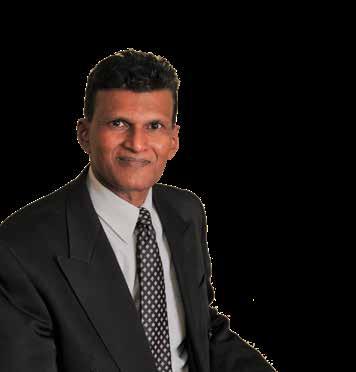
Support at the UIF, to talk on how employers and employees can claim from TERS, and to address just some of the challenges they are encountering when claiming benefits.
WHERE IS TERS CURRENTLY?
In mid-February this year, President Cyril Ramaphosa announced a welcome extension of TERS, which is now in Phase 2 of the programme. As of 6 April 2021, further benefits can be claimed by employers and employees for 16 October 2020 to 15 March 2021. This is split into two periods; the first being from 16 October to 31 December 2020, and the second from 1 January to 15 March 2021. The UIF is presently only focusing on claims for the first period of Phase 2 and will process applications for the second period at a later stage.
Although applications for Phase 1 are now closed, with all claims processed and benefits paid for the period from 27 March to 15 October
2020, the UIF opened its appeals process from 6 April 2021 and it is working through rejected claims for Phase 1. It aims to ensure a turnaround of five working days to pay out benefits from the date of all applications being successfully lodged.
BACKLOG TO MANAGE ISSUES OF NON-COMPLIANCE
Employers can claim benefits from TERS on behalf of their employees only if they have declared their employees as contributors to the UIF. As Allan pointed out, a large number of employers only registered their employees with the UIF at the beginning of lockdown, and not when the employee first started working for the company. This has been problematic, as it resulted in a massive influx of employee declarations together with TERS claims. The UIF is working to correct this but it has impacted the processing of other already-compliant claims.
“Employers did not declare timeously prior to lockdown and only declared when they wanted TERS payments. In terms of the law, this should
www.theplanner.guru FOCUS UIF
With applications for Phase 2 open as of 6 April 2021, the UIF is working to ensure it can pay out benefits for TERS applicants as swiftly as possible.
Allan Ragavaloo, director: Provincial Support at the UIF
not be the case,” explained Allan, highlighting that compliance of registered employees “is not even close to 100%”.
WHAT IS NEEDED FOR CLAIMING TERS?
Among letters of authority and acceptance, as well as other supporting documentation relevant to the UIF, employers also need a successful bank verification, which can take anywhere between 24 hours to 14 days depending on the type of verification. Additionally, employers need to input a standard industrial classification (SIC) code. Assigned to a company to describe the nature of the entity’s business, SIC codes are another verification and are particularly important if employers are claiming benefits because they fall into a sector that has been affected by the pandemic and lockdown.
SIC codes given to the UIF must match what the South African Revenue Service (SARS) has on its system, as this is what is used for verification. Previously, a major challenge for claimants was ensuring they have the correct SIC code, as some of these were not corresponding on the TERS portal, which resulted in applications being rejected. While this has reportedly been resolved, TERS applicants are encouraged to confirm these details prior to submitting claims.
Since the launch of TERS, there have been accounts of many fraudulent claims, with employers claiming on behalf of deceased individuals, or those who are minors below 16 years old and the legal age of employment. This has seen the UIF put in place much stricter controls to ensure that both national as well as foreign citizens can be compensated, with the UIF cross-checking all identifying particulars across other government entities’ databases, namely the Department of Home Affairs and SARS.
Employers are also required to prove that funds have been disseminated to employees.
WHO CAN CLAIM FOR TERS?
Benefits will be granted if an employer’s business forms part of a sector that has been affected by the lockdown. As agreed by the National Economic Development and Labour Council (Nedlac), this was extended to the hospitality, tourism and liquor sectors in Annexure A of the TERS directive. Businesses whose operations are directly linked to and are impacted by these sectors, such as farmers who grow raw materials to produce liquor products, or transporters moving liquor goods specifically, can also now apply for benefits.
As of 22 April 2021, employers will be able to claim benefits on behalf of employees who are
either elderly, living with comorbidities, or who have had to go into isolation or quarantine. This is not specific to any sector. Employees who have experienced temporary lay-offs or who have been placed on short time will also be able to claim for compensation of lost income.
Meanwhile, any employee who has been retrenched or had their services terminated must rather claim in their individual capacity by applying through the traditional UIF uFiling portal, and not through TERS.
OTHER ‘BLOCKS’
In its efforts to ensure that all claims are processed and benefits paid, it is anticipated that by May, the UIF will be able to send letters to each of the employers on its database to explain why their TERS claims were unsuccessful.

“Every non-payment is accompanied by a description,” noted Allan. This, he added, is where employers have an opportunity to take action; however, cooperation and compliance on the part of the employer are hurdles the UIF is trying to overcome.
To manage the approximately 15 million entries it has received during the lockdown period, the UIF has employed more agents at its call centres to assist with the high volumes of
queries. It has also put in place provincial uFiling champions to guide employers and employees on their TERS claims. The UIF is in the process of establishing a case management system so applicants can track their claims, which is expected to be up and running by mid-May.
In a bid to have a watertight process that is completely above board, the UIF utilises the services of seven audit firms and an investigative unit to ensure claims are paid out correctly.
“We have to be accountable for who is and who isn’t paid,” said Allan.
POSSIBLE FURTHER EXTENSION
Despite it being too early to tell whether another extension of TERS is on the horizon, the TBCSA is determined to get this right and ensure all claims are paid.
“As for whether TERS is going to be extended, as Allan said, we will work through the Nedlac process. I do sit in on that process, as [has been] done in the past, to get this extension. There’s of course a lot of negotiation that goes into it… Everyone who has applied and everyone who qualifies to be paid, will be paid. The process may take a little bit longer but we will do whatever we can to make it happen,” stated TBCSA CEO Tshifhiwa Tshivhengwa in closing.
www.theplanner.guru MEETINGS l MAY/JUNE 2021 • 17 #TERS
RESOURCES • UIF TERS portal • UIF TERS FAQ • SIC codes • UIF call centre 0800 030 007
A REPORT FOR AFRICA , BY AFRICA

Niche Partners, a research and advisory service provider, recently launched the 2021 African Perspectives on the MICE Industry Report in association with Meetings
Research on the African Perspectives on the MICE Industry Report began a year ago. This is being driven by Niche Partners – a leading research house with a team passionate about research and data, specifically within the MICE industry.
“The research process was not the easiest journey, as Africa is unfortunately not strong on data collection; however, we’ve collaborated with various partners across the continent and the results made all our efforts worth it,” says Londi Khumalo, managing director at Niche Partners.
Although the report does not cover all African countries due to limited data collection in the MICE industry, this is the most comprehensive report available for the sector. It covers 16 MICE-active African countries, which were narrowed down by making use of existing international meetings industry reports and data, and supplemented with further research.
“We are extremely proud of not only the research we have done but the potential revenue and growth possible for the continent, as the insights will help the industry plan for African growth,” says Londi.
KEY FINDINGS
The launch highlighted key findings across Africa’s broader economic forecasts and source markets related to tourism. The African Perspectives Report takes into consideration the top GDP-generating sectors of each country, and the potential for MICE opportunities in these sectors, as well as primary
survey data on leading client and supplier trends. Four major findings shared during the launch were:
1Africa’s MICE industry is largely still in a nascent stage Niche Partners found that 68.8% of the African MICE market is in a nascent stage. Niche Partners has developed a maturity indicator that considers various factors including the formalisation of the supplier industry in a country, the existence of a MICE sector country strategy, the government prioritisations expressed as a strategy for the MICE sector, and the presence of an active convention bureau in each region. The research found that most of Africa still lacks the necessary structure and prioritisation of the establishment of a MICE industry, with many countries focused on leisure tourism and other sectors.
On the other end of the spectrum, only 12.5% of the researched countries fit into the managed supplier category. These are countries that have met the requirements of having a formalised supplier industry, existing MICE country strategies, together with active convention bureaus established for a period longer than five years.

“It was found that new convention bureaus are being established across the continent but do not yet have performance data that could be used. It was therefore decided that the cut-off of five years enables us to look at past performance and establish whether strategies were implemented,” says the team at Niche Partners in its analysis.
2 Only 31% of the African countries have existing MICE sector and/or African strategies
Niche Partners’ research shows that many ministries of tourism across the continent are aware of the MICE sector’s possible
economic contributions but only 31% of the researched countries have existing strategies with proof points of implementation such as convention centres, bid notifications and marketing positioning towards the business events market. It appears that some African countries lack the understanding and necessary skills to formalise their country strategies.
In addition, a component of Niche Partners’ maturity indicator is the priority of an African strategy. This indicator reflects the countries that have an existing African MICE strategy with the prioritisation of intracontinental meetings, incentives, conferences or exhibitions that are rotated at a country level. Unfortunately, none of the countries researched fit this criterion, representing an unexplored opportunity with massive potential for Africa’s MICE industry.

3 Economic growth in certain countries is promising
The report extrapolates the macroeconomic implications of global country competitiveness and, in particular, the growth of the MICE industry. It highlights that from the MICE-researched countries, 44% are considered fast-growing economies, with 25% currently in recession. The in-depth SWOT analysis of each country enables the industry to further consider the political and social factors that may enhance or inhibit a MICE
18 • MEETINGS l MAY/JUNE 2021 www.theplanner.guru
RESEARCH
there
MICE strategy?
We hear from the team on its ambitious plans. Is
a
YES NO
MEET THE TEAM
Fast growing Recession
growth strategy by considering these regions. The summary means that industries such as the MICE sector should be considered for future intraAfrican growth strategies based on their current and projected economic growth.
Each country prioritises key economic sectors for growth. Within Africa, as an example, a significant proportion of the economy is reliant on agriculture.
“We have especially highlighted these sectors so that our clients know where the low-hanging opportunities exist for conferences, incentives and exhibitions. The report has connected the dots between the economy and the MICE industry,” says Londi.
4 At least 250 opportunities exist for intraAfrican rotations
The Niche Partners team has collected 250 opportunity MICE prospects that are targeted at the African market on the continent. These 250 opportunities open up vast opportunities for suppliers and clients to discuss rotations on the continent. The opportunities are carefully selected to align with economic sectors that are performing well.
Niche Partners is currently in the process of validating 250 MICE opportunities that are targeted at the African market to determine which ones currently rotate and present opportunities for regional rotation. The AfricanPerspectives ontheMICEIndustryReport will include this on a complimentary basis for its report buyers.

“We want the report not just to include insights but to offer a great strategic starting point. We believe the African continent is truly alive with opportunities for our industry, and our efforts are geared at being part of the African Union’s mission through the African Continental Free Trade Area (AfCFTA) Agreement. We are creating the Africa we want and that is an Africa that is growing economically, with reduced unemployment. We’re playing our part in this,” Londi concludes.
The African Perspectives on the MICE Industry Report willbereadyforpurchaseattheend ofJune.Formoreinformation,kindlycontact LeanaRobsononbusiness@nichepartners.org.
Niche Partners’ head office is based in Cape Town with a satellite office situated in Durban. Niche Partners was established as a leading knowledge hub for the business tourism industry in Africa. It is a proudly African research and advisory firm focused on developing insights for the MICE industry.
The company’s vision is to consistently offer clients cutting-edge research and data by prioritising the quality of research and providing clear, insights-driven and readerfriendly reports.
Using qualitative and quantitative research to answer the MICE industry’s call for more African-originated data, the team at Niche Partners hopes to see the MICE sector realising growth and opportunities for its people, and thriving as a platform for innovation and development across Africa.
Niche Partners believes this can only be achieved through smart collaborations with future clients, together with well-informed decision-making.
LONDI KHUMALO
With more than 12 years of experience, the managing director and founder of Niche Partners, Londi Khumalo, established the organisation in 2018 as a catalyst for change in Africa. Whether it is behind the scenes or in plain view, Londi is eminently passionate about transforming the economic landscape of Africa through sustainability and delivering exceptional customer services.

LEANA ROBSON
With a career spanning over 13 years, Leana Robson is a business development consultant at Niche Partners. She has worked in high-performing tourism and events businesses, and is passionate about job creation, marketing and creating value for clients. Leana believes that forming real connections with people is the backbone of any business. She joined the team to focus on the development and growth of the Niche Partners’ growing portfolio of African MICE clients.

RIVANIA GOVENDER
Rivania Govender is an experienced project coordinator. With a demonstrated history of working in the hospitality industry and a strong focus on research, business development and commercial projects, Rivania plays an important role at Niche Partners. Her career began at the iconic Durban International Convention Centre where she moved through the ranks as research and commercial sales coordinator.

www.theplanner.guru MEETINGS l MAY/JUNE 2021 • 19 #AFRICANPERSPECTIVES
Stable
CLICK HERE
The full video of the launch of the African Perspectives on the MICE Industry Report can be viewed here.
WHEN ONE DOOR CLOSES AND ANOTHER OPENS

The SITE Skills Retention in Hospitality virtual conference highlighted the radical loss of talent and experience our industry is suffering, as a direct result of Covid-19 restrictions. On the one hand, this is a terrible blow for the industry, but on the other, this opens the doors for new talent to spread their wings and fly.
The ‘chicken-and-egg’ contradiction has existed in our industry as long as memory serves: young people entering the market need jobs but employers are looking for experience. What ends up happening is that very little new talent has entered the market and we are now faced with an ageing segment with all the experience and very little, if any, succession planning.
One positive aspect of the events and exhibitions industry is that we have natural resilience. As event planners, hotel managers, banqueting coordinators, front office and AV people, we are faced with challenges every day. Changing or adapting plans at a moment’s notice is part of our daily activities. This has made us experts at crisis management and problem-solving.
So, let’s solve this problem. As it is, our global industry is facing a massive brain drain and teams at all levels have had to adapt and upskill. We put a brand-new meaning to multitasking, as hotel sales managers are cleaning rooms and serving coffee at breakfast, among other tasks!
WHERE WE ARE
We have already acknowledged that our industry will not be operating at full velocity when events and groups return. Now is the time to find the talent out there and start preparing them for the next phase. There are many event and hotel management students in their final year of study but with minimal practical experience available to them. Let’s work together to find the funding and start creating small training events. This will also be an opportunity for the seasoned, out-of-work experts to pass on their skills and experiences while sponsors fund mentorship programmes. Several associations within the SA Events Council have successful youth development programmes, including the South African Communications Industries Association (SACIA). SACIA has established eight oncampus student chapters at a university level, encouraging members to provide mentorship and work-integrated learning opportunities to enhance students’ academic learning experience. In addition, they have formed an alliance with the South Africa Film Academy based in Cape Town – again, to enhance practical work experience and assist students in earning a SAQA-recognised professional designation aligned with their skills and competence. Sadly, all of this has slowed down as a result of Covid-19 restrictions.
The Southern African Association for the Conference Industry (SAACI), meanwhile,
has actively worked on developing young graduates within the MICE sector by initiating a branch-level congress in the Western Cape. This congress is aimed at educating the events management students of Cape Peninsula University of Technology with information on the type of work the industry does and how to go about planning a successful conference, exhibition, meeting or event.
SAACI also plans on establishing a national youth brand. The launch of this took place during the SAACI Annual National Congress in May 2021. The youth brand will focus on the resources required by students and graduates to grow their careers, study paths and the sustainability of the industry’s future by providing necessary insight into the industry with expert guidance.
Insight initiatives will include a separate national youth committee with participants from around the country, workshops and knowledge-sharing initiatives, as well as networking opportunities dedicated to the youth and an online student/youth portal accessible from the main SAACI website.
SAACI is inviting all academic institutions with business-events-related course offerings to contact the SAACI National Office at members@saaci.org for information on how to get involved in these exciting programmes.
20 • MEETINGS l MAY/JUNE 2021 www.theplanner.guru SKILLS
Covid-19 has resulted in the significant loss of talent across many industries, with the MICE and hospitality sectors being no exception. Tes Proos* shares her thoughts on how we breathe new life into talent pools.
THE FUTURE IS IN OUR COLLECTIVE HANDS










SITE Africa has also recently launched its first Young Leader Committee. Its core objective is to network within the










































MICE industry across the continent, share knowledge and experiences, and drive education opportunities. Connecting with like-minded future leaders promises to yield some innovative ideas, strategies and future potential for this group, which has shown strong vision in ensuring that the current leading professionals of the sector are also engaged and included to allow for a mentorship programme within the structure. The future of our industry lies in the hands of the next generation, but the success of this drive lies firmly in the hands of those of
us involved in this sector right now. Let’s take this to the next level and ensure that our new, young leaders are fully equipped to take over the reins and lead us into the next chapter.

*Tes Proos is the founder of Crystal Events and the president of SITE Africa.



#NEWTALENT
The future of our industry lies in the hands of the next generation, but the success of this drive lies firmly in the hands of those of us involved in this sector right now
Join Meetings magazine as we discover some of the top intimate meeting settings and trends safely delivering on exceptional in-person experiences in these extraordinary times.
MEET SMALL
Towards the middle of May, a third wave of Covid-19 was announced in South Africa. Within days, numbers spiked from around 800 daily cases to over 3 000.



According to stats from Wunderman Thompson quoted on Cvent’s Socialtables, “83% of Gen-Zers have a newfound appreciation for in-person interactions, and it’s likely that most other generations feel the same way.” As planners and organisers, we are driven to create the most engaging social experiences; however, the reality of hosting live events during a pandemic is that we need to be particularly careful when managing in-person meetings and events, failing which, we could face serious
legal consequences. This is why it is crucial to follow the various government regulations together with guidelines specific to the events industry to inform the health, safety and hygiene protocols we need to adhere to when bringing together face-toface meetings.

While establishing resources to identify and put in place measures to sufficiently mitigate against all possible risks is key, risk is calculated on numbers and the larger the attendance, the greater the liability.
VENUE SAFETY FIRST
Take the time to find a suitable venue because providing a safe place for your in-person meeting or event forms a major
part of giving our clients and delegates assurance that all aspects of their experience will be handled in a way that considers their complete well-being. Each venue will have their own controls to address health and safety risks but these alone do not mean that any procedures or documentation can be overlooked on your part. It is therefore essential to understand all current protocols and requirements – as an example, when hosting an event for more than 50 people anywhere within the City of Johannesburg, JOC clearance needs to be obtained. It will be easily determined during this process if our venue does not meet the requirements for safely hosting larger in-person meetings.
22 • MEETINGS l MAY/JUNE 2021 www.theplanner.guru MEETING PLACES
Even for smaller meetings, risk needs to be properly managed and consulting with your venue of choice each step of the way will go a long way in how you create an impenetrable bio-bubble.

INTENTIONAL OBJECTIVES
With time and resources being strained, the bottom line of why we do anything has become an imperative of how we work. For this reason, now more than ever, we must be clear on the objectives of our in-person encounters and specific about the sort of engagement we wish to create. Avoid talkshop discussions and set an agenda with distinct discussion and action points with well-defined roles. And remember, an agenda will be a solid starting point for delivering on a successful meeting but if we don’t create an environment that is conducive to a good balance of interactive dialogue, this will be a futile effort. In this respect, the old tricks of the trade apply and it’s where our creativity as planners can shine. It is also where setting the right mood and pace for your event will feature.
EASY ACCESS
If we are expecting most of our attendees to arrive using their own transportation, we need to provide clear directions for them on the location of the venue, as well as what they can expect upon arrival. If guests arrive after getting lost or not having a clear sense of where they need to go, it will leave them feeling flustered and not start their in-person experience off on a positive note. Drawing up maps, directions and a step-by-step of screening processes together with your venue will assist delegates in finding their way to where they need to be. If your meeting is small enough and it makes sense to do so, consider setting up a group chat so that this information is easily accessible, and you can communicate with participants on any changes or updates.
LIGHT, BRIGHT, BREEZY
With social distancing protocols in full swing, it is no surprise that most people don’t want to spend too much time in an enclosed space in close proximity to large crowds. At the same time, venues with traditional air conditioning need to adhere to certain standards so that if there is a Covid-19 case on their premises, they do not end up circulating it throughout the entire venue. This has resulted in many venues completely overhauling their air-conditioning systems and installing the latest in filtration and purification technology. Strike the perfect balance with a venue that has as much natural lighting as possible and creates a bright, open space with good airflow. Weather permitting, outdoor and garden venues are a good choice for most meetings and events.
THE ADD-ONS
Pandemics aside, everyone enjoys
personalised pampering. This does not need to blow the budget of your meeting or event, but showing your guests that some thought has gone into acknowledging their presence will be appreciated. Consider a small gift such as a mug or mask with each attendee’s name, or individually packaged care packs with sanitisers and snacks that can be consumed at home. Whatever addons you provide, ensure that these are sanitised and confirmed as being safe to distribute to your delegates.
For anything that is consumed on-site –such as tea, coffee or light snacks – ensure that proper social distancing is observed. Care must be taken to ensure that all mugs and spoons are properly wrapped or given to each guest already sanitised. Food must be properly covered and arranged so that multiple hands cannot touch the same item. This will need to be addressed with either the venue or caterer, if they are an external supplier.
CONNECT WITH CONFIDENCE
Socialtables
The way we meet has changed significantly over the past year-and-a-half. Indeed, we may never meet in the same way again. Meetings hears from The Westin Cape Town, a Marriott International property, on how the hotel is working to create the ultimate setting that delivers on impact without compromising on safety.
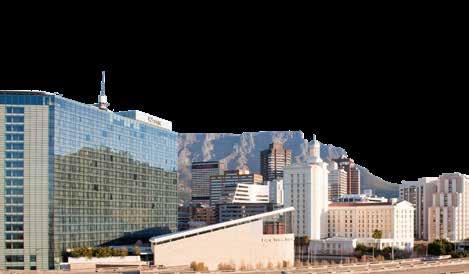
The planning and execution of meetings and events are constantly evolving in the pandemic era. Meeting and event professionals have been looking to plan hybrid virtual/in-person meetings and events as the meeting industry adapts to new ways of connecting during the global pandemic. However, meeting and event planners often require additional information about available technologies, health protocols, and logistics available to them. Through the Connect with Confidence programme, Marriott International is offering innovative solutions, insights and guidelines to help planners streamline their planning and execution. New and updated resources for hybrid meetings and events, including provider and pricing information, are being rolled out globally.
As part of the Marriott International group, The Westin has responded to the current bio-bubble trend, which is enabling safer sports, conferencing and other group travel across the world. Bio-bubbles create safe hospitality spaces to reduce the risks of Covid-19 contact as far as possible across multiple aspects of a hotel stay, services and events. Measures include providing larger event spaces to enable social distancing, more open-air event spaces, medical areas for conducting routine health screenings of attendees, as well as clear guidelines and protocols to promote safer hotel stays and events. Addressing these issues, The Westin Cape Town provides guests with customised experiences in the creation and maintenance of personalised bio-bubbles for each conference and event.
www.theplanner.guru MEETINGS l MAY/JUNE 2021 • 23 #SAFETYFIRST
As long as you keep your events safe and compliant, there are opportunities for unique and profitable inperson experiences.”
‘Aha’ MOMENT
Meetings speaks to the team at The Travel Corporation about the roll-out of an innovative solution that presents third-party suppliers with the opportunity to showcase their offerings alongside its DMC portfolio.
After lamenting its losses over the past 18 months, the tourism industry is slowly picking up again. While several funding schemes have been put in place, initiatives that create greater cohesion among the embattled sector are providing a means to support the tourism value chain more meaningfully.
In May, The Travel Corporation (TTC) revealed that it would be opening up its destination management company (DMC) portfolio as a solution for third parties to white label and customise their offerings.


“During the uncertainty of the pandemic, we spoke to a number of our partners who were looking for an operational solution with the

quality, knowledge, infrastructure, consistency and financial resilience to deliver on the ground in a new post-pandemic world – but they were hitherto unaware of the depth and breadth of TTC’s destination management portfolio,” says Gavin Tollman, president of TTC.
TTC’s 12 DMCs offer holidays, local experiences, corporate travel and ancillary services across Africa, Europe, the Americas and the South Pacific. It also serves as the ground handler for numerous internationally recognised travel brands. Realising its potential to grow this space, TTC’s new website – together with its marketing assets and training – will bring its range of experiences, global footprint and financial benefits to life.
“They were excited when they realised we could provide that solution across multiple destinations worldwide, affording them deeper access to the award-winning expertise and service for which our brands are well recognised. By launching a dedicated website and a series of new tools outlining the extent of our offering, and the financial strength that supports it, we hope to be able to present this hassle- and risk-free opportunity to a wider
range of leisure and corporate travel businesses,” explains Gavin.
TTC’S OFFERING
From culturally immersive escorted travel and day tours, to bespoke features including custom groups, meetings, conferences and events, TTC’s solutions are rich and varied. With its DMCs working with well-known travel brands, TTC anticipates that the launch of its dedicated website and accompanying assets will broaden its reach.
“In addition to offering travel businesses the opportunity to expand their product range with a partner that has robust health and safety protocols, most importantly, they can pay in their local market currency and not have to worry about working with an international DMC. The price they will get from the DMC is the price they will pay, which is a huge advantage in a post-pandemic world,” says Kelly Jackson, managing director at TTC.
Part of TTC’s message is to reiterate its financial stability after 101 years of expertise and innovation in the travel space. Earlier in the pandemic, TTC made the unprecedented decision to reveal that its officially audited unencumbered fixed assets are in excess of US$300 million (R4.2 billion), thanks to its ownership of the luxury Red Carnation Hotel collection. It shared this information for the sole purpose of providing partners and agents with the reassurance that TTC is highly solvent, operationally stable and that investments are safe.
LOCAL TRENDS
In South Africa, TTC is showing international travel demand increasing from September 2021 onwards.
24 • MEETINGS l MAY/JUNE 2021 www.theplanner.guru
INNOVATION
Gavin Tollman, president and Kelly Jackson, managing director at TTC
By launching a dedicated website and a series of new tools outlining the extent of our offering, and the financial strength that supports it, we hope to be able to present this hassle- and risk-free opportunity to a wider range of leisure and corporate travel businesses.”
“We do have dates and rates available up to and including 2023, providing our travellers with the choice of when they want to or feel comfortable travelling – we have never had rates out so far in advance. In addition to our dates and rates, we have flexible booking conditions that do allow for change for whatever reason up to 30 days prior to travel, presenting travellers with peace of mind when booking,” says Kelly, noting that consumer sentiment changes very quickly for the positive in other countries where vaccination programmes have started rolling out.
“There is certainly pent-up demand and we at TTC are ready for travel to resume – but it will take an effective vaccination roll-out programme in South Africa to get us to full recovery and of course other countries to reverse their bans on us allowing vaccinated South Africans to travel,” she concludes.
ADDED VALUE FOR ITS PARTNERS

TTC’s DMC programme is available for English-speaking markets and it also offers guided custom group trips in other languages, including Cantonese, Mandarin, German, Italian, Japanese, Spanish and Turkish.
Through longstanding industry connections, TTC’s DMCs can deliver a range of unique and often exclusive experiences, including:
• Sunrise visit to Bruce Munro’s Field of Light installation at Uluru, exclusive to AAT Kings.
• 4x4 off-road drive in a Land Rover through the breath-taking scenery of the Scottish Highlands with a local safari ranger, looking out for grouse, red deer and golden eagles, with Brendan Vacations.
• Visit to a Lizauli village in Namibia, meeting the community and learning about their daily lives and customs, including meeting a healer and enjoying traditional dancing, with Cullinan Namibia.
• Meeting a champion dog musher and his huskies in Alaska, with Destination America.
• Enjoying a hot-air balloon ride over the Serengeti or a private island escape off the coast of Mozambique, with Grosvenor Tours.
• Truffle hunting in Meteora, Greece, followed by a meal of truffle pasta prepared outdoors in the field, with Siva Travel.
• Dining after hours in the Vatican or learning to flamenco dance, with TTC Europe & UK.

For more information on TTC’s DMC brands, offering and USPs, email dmc@ttc.com.
THE SUCCESS OF TTC’S DESTINATION MANAGEMENT PORTFOLIO IS ROOTED IN:

• Local expertise, global footprint –12 DMCs operating in Africa, Europe, the Americas and the South Pacific, available to businesses in multiple selling regions worldwide.
• 101 years of experience – delivering award-winning travel and hospitality experiences with proven excellence, acclaimed by industry, media and customer review sites.
• Risk-free investment – TTC assumes
all the risk of currency fluctuation, as businesses can pay in their local currency. Furthermore, TTC’s financial strength, longevity and integrity provide the ultimate peace of mind that investments are safe.
• Committed to guest well-being –with the latest well-being protocols and the best care team (both on the road and with 24/7 office support), partners and guests can trust in the
family of brands’ commitment to provide a greater sense of comfort when travelling.
• Committed to making travel matter –with an industry-leading climate action plan, and responsible travel at the heart of its business, companies can be sure that their brand will be delivering experiences that support people, planet and wildlife in each destination.
www.theplanner.guru MEETINGS l MAY/JUNE 2021 • 25 #DMCs
Celebrating female excellence across the industry
Coming this August…
The Women in MICE Awards achieved new heights in 2019. After being postponed in 2020, we are looking forward to the upcoming instalment of this exceptional event.
To nominate your candidate, please fill out the nomination form below, scan and send this back to wim@3smedia.co.za Alternatively, download the nomination form from www.theplanner.guru
Nomination Form in MICE
NOMINEE INFORMATION
Nominee name
Is the nominee a service provider or buyer/event planner?
Qualifications
Is the nominee an association member; if so, which association? (SAACI, EXSA, SITE, PCO Alliance Network, ICCA, etc.)
Category (select one of the 10 categories listed at https://theplanner.guru/women-in-mice/nominate)
Current company
Current position
Career to date
Significant achievements in the last 24 months
CAREER INFORMATION
LEADERSHIP PASSION CREATIVITY INTEGRITY MENTORSHIP RELATIONSHIPS


Carefully considering the above criteria, please provide a motivational paragraph about the nominee. Where possible, please provide examples of where the above traits/achievements were exhibited/made.
YOUR
NAME AND CONTACT DETAILS
Please include a high-resolution photograph of the nominee. All nominations must reach wim@3smedia.co.za by 9 July 2021.
Only nominations submitted on the official nomination form will be considered.
Guy Bennett, general manager and director at Gorgeous George , Cape Town, on culinary trends, preparing meals for large numbers and how Covid-19 has affected all of this.
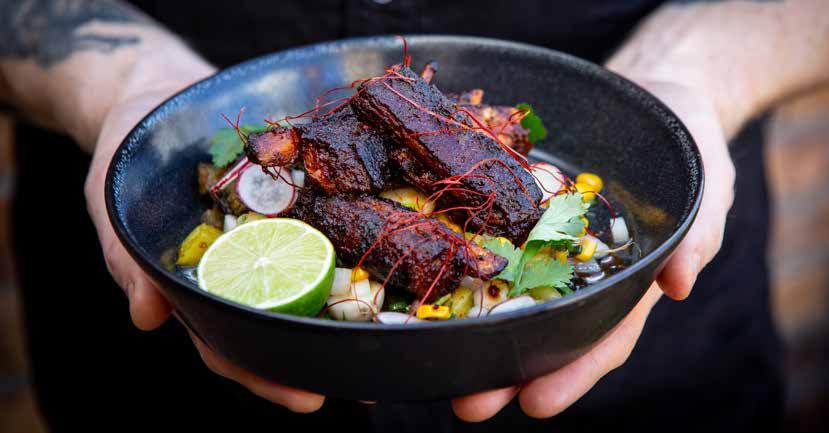

CULINARY TRENDS

There is movement towards understanding and caring for where the produce comes from – from the origin of the meat, which is centred on ethical farming, and who caught the fish, to who grew the fruit and veg, and made the cheese and butter, as well as how they go about this. It’s an intertwining awareness around what is seasonal, where produce comes from, and ultimately how it makes its way to the plate. This is also very exciting and fulfilling.
PREPARING MEALS FOR LARGE NUMBERS
With regard to larger group formats, I generally like to keep the food style simple, rustic and hearty but focusing on slow-braised cuts of meat; fresh, al dente seasonal vegetables; and a delicious, classic house sauce, such as red wine jus, that really shines and brings the dishes together. A few well-thought-out components on a plate are enough. Don’t overdo it – less is more. It’s all about planning out the different cooking and serving times, and the order of events. Foresight and looking ahead is everything.
How has the Covid-19 pandemic changed what you do and how you do it?
For me, in general, this shock to our reality has brought on an even bigger awareness and appreciation for what I have: to be able to do what I love and to have special people in my life; to live in such a beautiful country with all it has to offer; my good health – the list goes on and on. No point in moaning about what isn’t going right. I’m constantly reminded that I need to be grateful for what I have and make the best of it. Rolling with the punches, helping others, and keeping the dream alive is essential, now more than ever.
SOUNDBITE
www.theplanner.guru MEETINGS l MAY/JUNE 2021 • 27
INDUSTRY VIEWS
Safety standards
Benchmarking safety
The South African Bureau of Standards (SABS) TC264 is a technical committee established specifically to develop and revise standards relating to the events industry. Its primary purpose is to develop SANS 10366 as the benchmark for standards set by industry experts in applying safety-first principles in the events environment. TC264 connects with similar standards-generating bodies worldwide to access and share information with colleagues, which aligns the work done by the TC264 with both the evolving needs of the local market and international trends that may affect the outcome.

The TC264 technical committee has a longrunning tradition of leadership by the Southern African Communications Industries Association (SACIA) and the Technical Production Services Association (TPSA). The standard was initially developed in response to the growing need for safety regulations for the events industry after the local events market started to boom post-1994.
The newly established TPSA adopted the British Standard for event safety, painstakingly adapted by the late John Shaughnessy for the South African context. The Event Safety Guide was published in July 2000. It was positively received by the industry and adopted by many training institutions as a teaching tool for their technical students.
The TPSA subsequently opened discussions with the SABS to convert the guide into a nationally recognised standard and a TPSA technical committee began the work under the guidance of an SABS standards writer.
The SABS launched the first edition of SANS 10366 in 2006, with subsequent editions published in 2009, 2012 and 2015.
“A vast range of sources gave input over time – from the SAPS, National Intelligence, the Department of Health, players in the events and theatre industries, various metro police departments, fire departments and emergency
medical services to pyro-technicians, events security companies and events organisers,” explains Barry Snow, former chairman of the TPSA.

INDUSTRY LED
When the TPSA reconstituted as a special interest group under SACIA in 2015, Barry stepped down from the TC264 and Kevan Jones, executive director at SACIA, maintained a leadership role within the committee. Between 2015 and 2021, internal changes at the SABS meant that, although the standard was reviewed and updated, no new editions were published.
The Event Safety Council is a vital cog in this process – we represent issues related to health and safety in the events industry, and this is a coordinated association that addresses issues of health and safety. It is essential that we, as subject experts, drive implementation and compliance. We aim to achieve recognition and global implementation of the standards we set, to keep people safe at the events we host. Driving this process and having a say in what is critical to implement to achieve this is extremely important.
As representatives of our industry and with the advent of the SA Event Council coalition, the various associations making up live, business and sporting events can align thinking nationally both across the private sector and through the authorities responsible for compliance.
28 • MEETINGS l MAY/JUNE 2021 www.theplanner.guru
After an eight-year absence, Mike Lord takes events industry safety standards forward as chair of the TC264 committee at the SABS.
MIKE LORD is a member of the SA Events Council, MD of Alliance Safety Management and interim chair for the Event Safety Council.
TALKING POINTS
We aim to achieve recognition and global implementation of the standards we set, to keep people safe at the events we host
INDUSTRY VIEWS
Elevating organised events
Sven Bossu tells us why he is looking forward to the upcoming AIPC Annual Conference in June.


The theme of AIPC’s Annual Conference this year is ‘elevation’, reflecting the ambition of the AIPC community not only to reopen for organised events, but also to take these events to the next level. It also made us think about how to make sure we reach our global membership, while offering a great experience.
I will start by being fully transparent: our Annual Conference last year was our first hybrid one and we learned a lot. Our list of things to improve did not seem to end and we were struggling when trying to find a magic formula. The key question was: how can we combine a digital conference with a live one and offer great value to all participants? Some examples: if you have a session where all speakers are ‘streamed in’, what is the value for the persons attending the live event? You might as well sit at home. And a networking lunch is great for the people on-site but watching each other eat sandwiches via Zoom is just not the same thing. We also faced the interesting challenge of time zones and how we offer the same value to our global membership – from Sydney to Toronto.
OBJECTIVELY SPEAKING
So, we took a few steps back and asked ourselves the most important question: what do the participants want? What creates value? In our case, that is straightforward: networking, learning and sharing ideas.
The next step was to define how this is best done in a digital environment and in a live environment, which turned out to be very different. So, we took the decision not to create a cocktail and go for the pure thing: we completely split the digital and live conferences and will in fact have two conferences, one following the other. Doing so offered several advantages when
it comes to creating value, because instead of desperately trying to find a (sub)optimal mix, you can choose the best fit-forpurpose solution. It does come with some consequences though.
LEARNING CURVE
For the digital conference, we wanted to offer participants an interactive version of the BBC World Service, so you get access to a similar, high-quality programme that fits your time zone. In practice, this means we start the digital conference days at 03:30 European time and run till 23:00. This also implies that you have shifts of audiences; you start with viewers in Oceania and Asia, followed by Europe and Africa, and end with the Americas. As a result, some of the content needs to be repeated to reach all audiences, but it must be scheduled in a way that viewers in a specific time zone have access to a programme with as few repeats as possible.
That said, 100% digital comes with a lot of upsides: it enables you to customise both format and content to the expected viewers at a given moment. It also allows you to fully leverage all the tools the digital platform used offers in terms of gamification, networking or experience and mitigates operational risks.
The same goes for the live conference, taking place in the SwissTech Convention Centre in Lausanne. Instead of putting in place camera teams and streaming technology, we could focus on offering the best possible on-site experience, leveraging the assets of the centre to function as a perfect platform for learning and networking – including breakouts, networking lunches and the much-missed coffee breaks.
The route chosen by AIPC might not be viable for all organisers, but I would recommend at least considering it.
SVEN BOSSU is the CEO of AIPC.
AIPC Annual Conference 2021
#INDUSTRYINSIGHTS www.theplanner.guru MEETINGS l MARCH/APRIL 2021 • 29
INDUSTRY
VIEWS
Growing the well-being economy
A better way to do business
During April, the Event Greening Forum (EGF) held a joint webinar with the SA Events Council exploring the concept of the well-being economy. Our guest speaker, Professor Lorenzo Fioramonti, Italian Minister of Public Education, explained how economic growth was initially pursued to improve the well-being of humanity but we’ve lost sight of this goal, and economic growth has become the goal in itself. A consequence of this is that our well-being is often sacrificed at the cost of short-term economic growth. This, however, is ultimately jeopardised in the long term, as we tend to defer costs forward – even if it means they will increase.

BURNING QUESTIONS
During his presentation, Fioramonti asked: “What does it mean for a country to be doing ‘well’?” He feels we are fundamentally confused. Using the USA as an example, he points out that despite low life expectancies and high levels of illiteracy and lifestyle-induced diseases, it is considered one of the most developed nations.
WHY, THEN, IS THIS THE MODEL WE ARE TRYING TO EMULATE?
Globally, we have become obsessed with economic growth at

INDUSTRY VIEWS
Demonstrating resilience
the expense of all other considerations. It is how we measure the success of nations, and how developed or ‘advanced’ a country is.
WHAT DOES THE WELL-BEING ECONOMY LOOK LIKE?
The ideal well-being economy should aim to promote healthy people and environments that support social cohesion and improve quality of life. Overconsumption drives pollution but focusing on quality will lead to producing and consuming goods and services in a manner that our world can sustain while still meeting our needs and supporting economies.
Fioramonti believes this shift can be encouraged by the mandatory inclusion of sustainable development in school curricula, which is already a reality in his home country. He is also consulting with governments of other nations to implement similar objectives in their schools.
This approach is in line with the EGF’s mandate and one that we wholeheartedly welcome and encourage.
Exhibiting strength after uncertainty


Reigniting the events industry is vital for its impact on networking and lead generation for the many brands and products that rely on the engagement and exposure events bring.
While we may have taken a pummelling in the early stages of the pandemic and lockdown, we are by no means out for the count. In fact, it may have taken the industry far longer to implement the digital solutions we have now, had it not been an absolute necessity.
THE FUTURE OF EVENTS
The hybrid concept of mixing in-person and live-streaming is a valuable ‘in the meantime’ response to taking events to the masses, where current protocols prevent that.
The offerings that have been rapidly brought to light at this stage include virtual showrooms for brands and the ability to view goods and services and purchase them via e-commerce.
Post-Covid-19, exhibitions are likely to combine multiplatform, device-agnostic events that run virtual simultaneously with in-person. The key benefit of a multitude
of combinations is choice for exhibitors, as well as real-time webinars for trading information, where attendees can engage from wherever they are in the world.
From a financial perspective, digital opens up huge opportunities for brands and organisations that already offer online engagement and transactions, which is likely to drive digital transformation more rapidly in South Africa.
EVOLUTION OPPORTUNITY
The opportunity for digital integration removes the restriction of venues, opening doors to every type of event to go hybrid. Where the initial shock of lockdown brought a sense of despair, the equally speedy positive response is likely to prove invaluable to the exhibitions sector in years to come.
As we refine hybrid offerings, I see the live exhibition becoming more exciting with the backing of its digital counterpart, and profitability – financially and in customer satisfaction – growing.
Where some thought we’d be forced to throw in the towel, I believe now is the time to step into the ring for the full 12 rounds.
TALKING POINTS
If well-being is not at the heart of our economy, what are we working towards, asks Lynn McLeod.
Carol Weaving understands how AAXO’s collective concern over the past year switched rapidly from shock to actively seeking solutions within the largely uncertain parameters of Covid-19.
LYNN MCLEOD is the Event Greening Forum (EGF) secretariat.
CAROL WEAVING is the managing director of Reed Exhibitions Africa, a member of the Association of African Exhibition Organisers (AAXO).
30 • MEETINGS l MAY/JUNE 2021 www.theplanner.guru
out the full video of EGF’s webinar right here!
CLICK HERE Check
Make your message stand out
As the pandemic set in and changed our lives forever, we must acknowledge that while the current regulations hinder how we do business, the importance of exhibitions within the MICE family of activities must never be underestimated.
As we prepare ourselves for the Global Exhibitions Day (GED 2021) on 2 June 2021 this year, the world will showcase the importance of exhibitions and business events to rebuild economies in the wake of Covid-19.
The annual worldwide campaign established by the Global Association for the Exhibition Industry, or UFI, is supported by more than 40 partner associations and industry bodies, including SAACI, AAXO and EXSA.

In hosting the SAACI Annual National Congress in a hybrid format, the role of our hustle hall market

and the key conversations were a microcosm of what happens at tradeshows. The sector is a major contributor to South Africa, both financially and for its ability to expand marketplaces by bringing buyers and sellers together and offering a platform for launching innovation, new products and services.
At present, the singular activity of exhibitions is being targeted by government yet the industry’s value chain cuts across many diverse sectors. While the complete value chain has shed jobs and businesses, the key to recovery is meeting in-person. The exhibitions industry will drive socio-economic recovery for many destinations, including South Africa. We call on government to play its part and #TrustUs , as the industry has demonstrated this past year that we can meet safely and responsibly.
We stand with you
While the PCO Alliance Network is working to support the entire events industry value chain, it would like to salute the industry’s venues in
The PCO Alliance Network has always set high standards in the events management sector of the hospitality industry. In the past 14 months, it has grown in prominence and importance in the industry, through active engagement with the SA Events Council and other member bodies. We have hosted our own Proof of Safety Concept Conference and remain engaged in every campaign to reopen events in South Africa such as #lightSAred and #TrustUs

With this growing voice, we would like to highlight the plight of the venues and suppliers who have always so generously supported us and who have suffered exponentially. Beloved hotels, restaurants, event spaces and industry suppliers have retrenched staff, and many have had to close down.
As the hotels and venues around the country have been gradually opening up for business, the PCO

Alliance Network and our industry colleagues have been hosted by various hotel groups and venues to experience the safety protocols they have in place. We have also been introduced to their dynamic and expert hybrid offerings, with live-streaming now a ‘must have’ and not a ‘nice to have’ component.
We have had regular Zoom updates with our industry colleagues and been introduced to brandnew and refurbished venues. We have also enjoyed excellent presentations of gorgeous hotels, lodges, islands and game reserves. We salute you all. And the show must go on.
This leads us to a great initiative we are planning for our industry colleagues taking place on 4 June 2021, with our Event Safety for Dummies event at the Focus Rooms both on-site and online. Check us out on Instagram, Twitter and Facebook for all the details.
www.theplanner.guru MEETINGS l MAY/JUNE 2021 • 31
Exhibitions play a key role in our economy and the ailing industry needs support to ensure it can survive, writes Glenton de Kock
CHERYL NORWOODYOUNG is the MD of Where Next Event Management and an exco member of the PCO Alliance Network. We need our exhibitions industry Supporting our SA venues INDUSTRY
INDUSTRY
VIEWS
VIEWS
GLENTON DE KOCK is the CEO of SAACI.
#TRUSTUS
particular, says Cheryl Norwood-Young .
Trending on trends
Do you remember doing the Macarena around the mid-1990s? Or when ‘dabbing’ was a thing but quickly became overdone and deemed uncool?
What is in today could be out tomorrow. And the way in which we were all able to adjust to the new, Covid-19-induced means of working and living in just a few short months shows us how quickly we can adapt.
RESPOND TO INSIGHTS
Businesses that have been able to quickly acclimatise to the new set of circumstances will have a better chance of not just surviving but being successful in their endeavours. The only secret sauce here is that these companies observed a trend and moved quickly enough to position their offering in such a way that they provided a product or service of perceived value. This is a simple and award-winning formula but it can go wrong if you do not adequately cover the fundamentals of the who, what, when, where, how

and, most importantly, why. While these are key factors in our campaigning and marketing efforts, they are also variable, and can influence everything from design to delivery.
Unfortunately, our product or service might not be a good fit for some markets. That, or the media and platforms we are making use of to drive our marketing efforts may not be seen by a certain demographic. This means that we need to better understand the habits of our audience and how these affect our product or service, as well as our approach to marketing and distribution. Failing to properly cover all bases could jeopardise our endeavours, especially if we are trying to replicate a successful offering or campaign elsewhere.
A COPY-PASTE APPROACH DOESN’T ALWAYS WORK
The well-documented flop of the mobile banking service M-Pesa in South Africa is possibly one of the strongest case studies to highlight how a copypaste approach can fail.
In 2010, Vodacom tried to emulate the success of M-Pesa in Kenya by launching it in South Africa. With just over 29 million subscribers and holding 99% of the market share in Kenya alone, M-Pesa changed the way Africans transact. It was hoped that we would see a similar uptake in South Africa but, after just 76 000 subscribers signed up for the service in five years, it was clear that this was unfortunately not to be, and Vodacom shut down M-Pesa in South Africa on 30 June 2016. Interestingly, M-Pesa has seen far greater success in Lesotho and the service reached a critical mass of subscribers just three months after launching.
This shows that careful research and planning need to be done to ensure you are able to establish a market where there is demand for your offering. If you already have a product or service that you can demonstrate, surveys can be easily done across a sample of your potential market. This sort of exercise will, of course, require resources to conduct surveys and capture the data, but may save you a great deal in the long run.
32 • MEETINGS l MAY/JUNE 2021 www.theplanner.guru
MISS MEET INDEX TO ADVERTISERS Champagne Sports Resort 21 Fancourt Hotel 12 & 13 Hilton Sandton IFC & OBC SAACI OFC & 4 Sun International 14 The Westin Cape Town 15 & IBC
The world is moving at such a rapid pace that if we don’t keep our fingers on the pulse, we will be left behind, writes Miss Meet .
Memorable experiences await at The Westin Cape Town


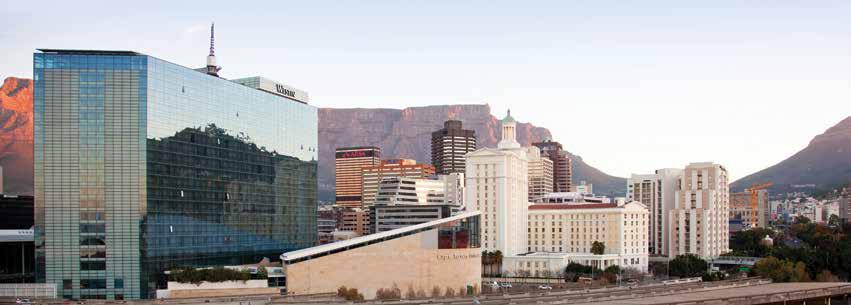

The Westin is an unrivalled meeting venue with 19 unique spaces. It offers some of the largest and most sophisticated hotel conference and banqueting facilities in the city, as well as a direct connection to the CTICC. The hotel’s personalised, efficient services make it effortless to provide a memorable experience for every invitee.
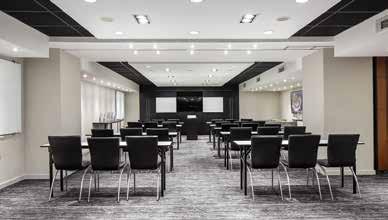
Enjoy exclusive rooms with unique views over the V&A Waterfront, Table Mountain and the whole of Table Bay. Each of The Westin’s 483 guest rooms and suites are elegantly appointed and boast the latest amenities for guests’ total comfort and rejuvenation. The iconic Heavenly Beds ensure a sound slumber for a restorative and productive stay.
The culinary diversity will also delight with a selection of elegant restaurants and bars on offer. From our Thirty7 Show kitchen to the Westin Club with its panoramic views on the 19th floor, as well the outdoor Louis B’s Terrace and indoor Raleigh’s Lounge and Bar.
To make a reservation, call 021.412.9999 or email wh.cptwi@groupreservations@marriott.com
TheWestinCapeTown westincpt westincpt westincapetown.com
SEYCHELLES.
Seychelles has many faces
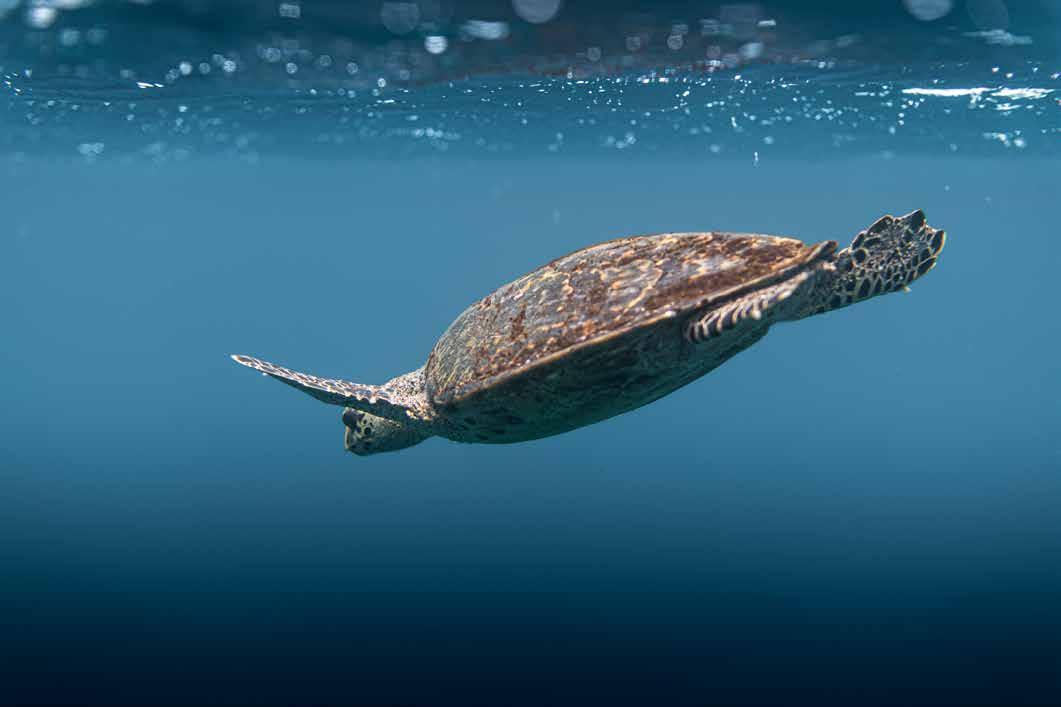
All of them teeming with beauty and nature
Whether
you'd like to set out on a

private
island adventure, reconnect at luxury pool villas atop



stilts, discover hidden
Seychelles do this
for you
waterfalls or
dive into
the blue, let Hilton


@hiltonseychelleslabriz @hiltonnortholme @doubletree allamanda Follow us on
INTO ANOTHER ORLD, HILTON Book our best rates on Hilton com |




















































































































































































